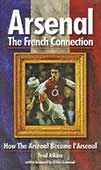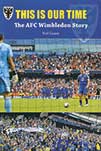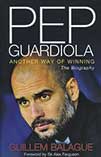{youtube}szwGJxx0ISM{/youtube}
 How the Arsenal became l’Arsenal
How the Arsenal became l’Arsenal
by Fred Atkins
GCR Books, £18.99
Reviewed by Damian Hall
From WSC 313 March 2013
There can’t be many football clubs that have a stronger connection to a foreign country than Arsenal do with France. Since Arsène Wenger took over, 23 French footballers have played for the Gunners – often in teams without an Englishman. Between September 10, 1996 and November 1, 2011 the club played only two competitive fixtures without a Frenchman in the team, both of which were experimental line-ups for relatively meaningless fixtures (and one included an unused French sub).
There’s a story to be told here and Fred Atkins is in a good position to tell it, having lived in France and studied at university in Strasbourg, the city where Wenger grew up and gained his oft-mentioned economics degree.
The book is logically divided into a chapter for each player and lengths wisely vary – you wouldn’t expect Patrick Vieira to get the same amount of coverage as Gilles Sunu. There’s a foreword by Gilles Grimandi, in which he self-deprecatingly confesses his one Arsenal goal was a mishit cross, but unfortunately there are no fresh interviews. Though tracking down all 23 men would have been a huge job, it means there’s little new here about the players’ times at Arsenal, bar occasional quotes translated from interviews with the French press.
The book’s interest comes largely from the players’ pre-Arsenal careers, such as the comical litany of bureaucratic errors by French football officials, one of which meant William Gallas couldn’t play first-team football for half a season at Marseille. No wonder his tantrums started long before his move to Arsenal. Many chapters are reminders that players’ foibles – Abou Diaby’s injuries, Mathieu Flamini’s perceived disloyalty – were there before they moved across the Channel. Some may enjoy the news that, while playing for Lorient against Bordeaux, Laurent Koscielny was once sent off for fouling future team-mate Marouane Chamakh and the obvious quips it encourages.
The Emmanuel Petit chapter stands out. His life has not been that of the average footballer: he’s struggled to deal with the death of his brother, depression, the USA 94 qualification failure (he played left-back in the defeat to Bulgaria) and periods of debauchery. Atkins also claims Petit drank and smoked throughout France 98. Perhaps more startlingly, after joining Barcelona, manager Lorenzo Serra Ferrer asked him what position he played. Petit almost joined Manchester United instead of Chelsea – and wishes he had.
However, Atkins’s tone is unashamedly parochial. There are puerile digs at Alex Ferguson, a tedious and paranoid rant about refereeing decisions and, apparently, Jacques Santini’s judgment should be questioned simply because he managed Tottenham, while crass speculation on Thierry Henry’s marriage breakdown belongs to the worst of the tabloid press.
Some bigger questions, too, go begging. Has Wenger systematically favoured French players over English players? If so, why? Should Le Prof still be recruiting heavily from Ligue 1 when the French national team are no longer pre-eminent – and when Alan Pardew seems better at it. And how has Wenger’s English seemingly got worse, “a little bit”, over the years?
 The AFC Wimbledon story
The AFC Wimbledon story
by Niall Couper
Cherry Red Books, £14.99
Reviewed by Andy Brassell
From WSC 313 March 2013
Author Niall Couper wrote in the Independent that his “stomach turned over” when AFC Wimbledon were drawn against Milton Keynes in the FA Cup second round this season. Nevertheless, it made his latest work all the more germane. This Is Our Time is Couper’s second book on Wimbledon, following 2003’s The Spirit Of Wimbledon which traced the area’s footballing lineage from 1922 through to the formation of AFC Wimbledon in 2002. You don’t necessarily need to have read that to grasp the thread of events for the sequel, though the opening pages of the book give a potted history of the club’s evolution from the 19th century to the brink of the Milton Keynes move.
The nuts and bolts of the story are well known to most regular football fans, from the three-man appeal commission that ratified the Milton Keynes move in late May 2002 to the open trials on Wimbledon Common that helped to find players for the first AFC Wimbledon team. Yet the book is plugging a significant gap – not just because of the detail contained in its 608 pages. The problem with any fan-based discourse surrounding AFC Wimbledon since their formation has been obvious. How do you establish an anti-establishment view when the fans themselves are that establishment?
There’s no whitewashing of opinion here (as anti-Milton Keynes voices have often been accused of doing) or even an author’s “this is how it happened” party line. Instead, Couper hands over the right to be heard to the people, with the story told by a succession of talking heads, from players and managers to board members, trust volunteers and those who pay at the turnstiles each week.
What emerges is not one linear truth but several versions of it, an account of the growing pains inherent in a protest movement becoming a semi-professional (and later professional) football club. So we hear about the dismissal of the club’s first manager, Terry Eames, through board members who became sick of him and fans who felt as if the club sold out “one of us”. There’s also the tale of how the club’s very ethos was questioned, with businessman Darragh MacAnthony’s attempt to buy the club out in 2006 before he assumed control of Peterborough United. Recently fired boss Terry Brown even offers a window into his own downfall, admitting he thought he may have “made a mistake” in signing defender Callum McNaughton from West Ham.
The format does occasionally spill over the line from thorough into exhaustive, such as in the section on reaction to the Conference play-off final win when it feels as if half the game’s attendees are canvassed for opinion. Yet This Is Our Time is a commendable, thorough and honest piece of work. Even if history is told by the winners, there’s nothing to say they can’t be objective and that’s what Couper does so well here.
 by Guillem Balague
by Guillem Balague
Orion, £20
Reviewed by Tim Stannard
From WSC 313 March 2013
If Pep Guardiola thought a sabbatical year spent hiding in plain sight in New York would offer a much needed respite from football, he was being a touch naive. Over four hairline-damaging years, Guardiola was in the news for what he had won with Barcelona. Since announcing his departure from the Nou Camp in April 2012, headlines have been dominated by what Guardiola might achieve next. The news that Bayern Munich are set to be the next port of call merely quadrupled the chatter, such is the fascination with the future of the former Barça boss.
In Another Way Of Winning, Spanish football journalist Guillem Balague offers a timely indication of whether Guardiola will ever be able to repeat his La Liga success in the Bundesliga. As well as recalling a stereotypical fairytale story of a gangly Nou Camp ballboy becoming the Barcelona boss via an outstanding playing career, the biography attempts to dissect Guardiola’s psyche to discover how a managerial rookie transformed Barça into one of the best club teams in the history of football.
Through testimonials from friends, colleagues, players and Guardiola himself, Balague describes a contradictory character who has both enormous confidence in his coaching abilities and philosophies on football, as well as frequent moments of self doubt and insecurity. Guardiola struggled to cope with conflict and confrontation, a necessary evil of his job, but still had the courage to jettison dressing room heavyweights such as Ronaldinho, Samuel Eto’o, Deco and Zlatan Ibrahimovic, for the simple reason that he had no connection or “feeling” with the players.
For an emotional personality, handling the expectations of supporters and media demanding constant success, keeping the team’s tactics fresh, the endless provocation from José Mourinho and the illnesses suffered by Éric Abidal and Tito Vilanova took too much of a toll. Guardiola struggled to separate his personal life from the job, a feat that one of his mentors in the game, Alex Ferguson (who writes the introduction), has been able to achieve. The physical transformation of the former Barça boss between his first and last day at his job is startling.
While the question of why Guardiola left the best club in the world was an easy one to answer for Balague, the poser of whether his success can be repeated elsewhere is a tougher one to tackle. The answer is positive. Guardiola did have outstanding talents at his disposal but his development of Gerard Piqué, Sergio Busquets, Pedro and to some extent the transformation of Lionel Messi into a pure goalscorer are often overlooked. As are the absolute commitment and passion that Guardiola would bring to any role.
Trying to break down the inner workings of someone’s psyche is a tough ask, especially one as complex as Guardiola who himself struggles to live with his conflicting characteristics. Nonetheless, Balague’s attempt is an intriguing and enlightening read on a figure who is still only in his early 40s and whose next challenge is about to begin.
